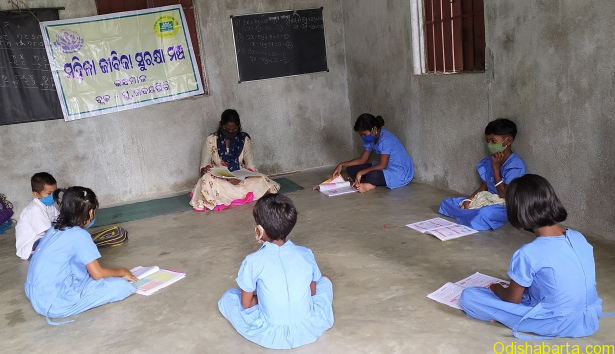College girls turn ‘teachers’ for tribal kids

(Government’s online education have remained out of reach for these children in tribal areas)
Bureau,Odishabarta

KANDHAMAL:Two girls from the tribal-dominated Jhimaghia village of Kandhamal districts have stepped up to teach tribal kids when they saw that children of the village are deprived of education after the lockdown was enforced to contain the COVID19 outbreak.
Jyotsnamayee Naik (23) and Bidhata Pradhan (22) are the two recent graduates from the same village who took up the responsibility to teach these children in batches both in the morning and evening shift.
When the state government started online classes, children of this village could not attend those classes. In the first place, the parents of these children are poor who found it difficult to buy a smartphone for this purpose. Secondly, internet charges are also unbearable for them, added with the patchy internet connectivity to this village that stood as a barrier for them.
Jyotsnamayee was first introduced with the remedial classes initiative by the local Sangathan Mahila Jeebika Suraksha Mancha, Kandhamal when one of their Janasathis explained Jyotsna about the initiative. Jyotsna, after discussing with the Jansathi immediately agreed to volunteer for this initiative and started teaching children from 15th of August. Subsequently, Bidhata, another graduate girl from that village followed Jyotsna after two days.
Every day, Jyotsnamayee and Bidhata teach 24 school students in 4 batches (6 children in 1 batch), 2 batches in the morning and evening and the parents are happy that their efforts have been helping these kids to continue pursuing their studies. Both Jyotsna and Bidhata use their homes as well as the village clubhouse to teach these children.
Jyotsna says “Schools were not open and children could not attend online classes. It was then the idea of teaching them struck me. However, I feel bad when the school teachers are sitting idle and the government is not engaging them for this purpose. Teachers should take remedial classes in their locality under the government direction”, Jyotsna adds.
Not only Jyotsna, but Bidhata also believes that teaching these children during the lockdown is proving to be crucial. “Many children were on the verge of jumping into vulnerabilities such as child labour. In tribal culture, child marriage is also more common than other areas. So, children aged between 13 to 15 years, were reportedly being encouraged for the marriage. These classes have not only helped them to learn but also have prevented them from being pushed at these social bearings”, says Bidhata.
“As we need to ensure physical distancing, we have limited the number of students attending the classes. Our objective is to ensure that the low performing children do not lose interest in their studies and catch up with their peers through the remedial classes”, adds Bidhata.
To ensure that children can access the education during the lockdown, Atmashakti Trust and its allies Odisha Shramajeebee Mancha and Mahila Shramajeebee Mancha, Odisha, have initiated a campaign called #mission 3-5-8 under which low performing students have been offered remedial classes across 16 districts in the state.
In Kandhamal, under the aegis of Jeebika Suraksha Mancha, they are running 110 remedial teaching centresin the district comprising of 660 students where 20 Janasathis and 90 local youth volunteers are teaching these kids who are mainly from Tribal and Dalit communities and they depend solely on government schools for their education.






